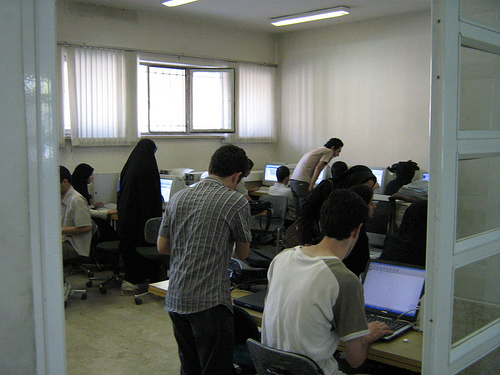

Iranian Internet users are reporting many popular Google products, including its email service Gmail, have been blocked.
Users in Iran reported Monday that Google Search was still available, but any product that required signing into an account was blocked. This included Gmail, Google Drive, Google Talk and others.
“Google is not accessible on https, but it’s open on http,” a Tehran-based computer science graduate told VOA in a Facebook interview.
Websites using https are considered secure, while http sites are susceptible to monitoring by virtually anyone, including governments.
“You can search, but any service that requires login, is closed,” the computer science graduate said. “Some people have saved their passwords on their Google accounts, so it redirects them on the https port, and for those people, Google doesn’t work.”
Another engineering graduate confirmed this, telling VOA on Facebook that with only http access, “anywhere you go, anything you search, can be controlled.”
The curbs on the Google products were announced in a mobile phone text message quoting Abdolsamad Khoramabadi, an adviser to Iran’s public prosecutor’s office and the secretary of an official group tasked with detecting Internet content deemed illegal.
“Due to the repeated demands of the people, Google and Gmail will be filtered nationwide. They will remain filtered until further notice,” the message read.
An Iranian group called Islamic Republic Virtual Activists issued a statement Sunday urging Internet users not to use Google services on Monday and Tuesday, following the appearance of the anti-Islam film “Innocence of Muslims” and a French magazine’s publication of caricatures of the Prophet Muhammed, according to the semi-official Iranian Students News Agency.
The statement accused authorities in the United States and other Western countries of blocking Islamic sites on their Internet services and providing cover for Google, Facebook and other social networks supervised by what it called “the Zionists.”
Technology experts are questioning Iran’s official explanation of the blockages. They say the outage may coincide with Iran’s development of its own national intranet, which Tehran says will be free of un-Islamic content and will be easier to monitor.
One technology expert in Tehran, who asked to remain anonymous, told VOA the anti-Islam video is “just an excuse.”
The video “is on YouTube, and YouTube had already been blocked for a long time. I think this decision was made a long time ago and they just needed an excuse to implement it,” the source said.
Criticism of the decision has not been not limited to Web users. The Iranian website Baztab, which has close ties to conservatives yet is critical of the government, published a report titled “Ignorant Friends in Line with Iran’s Sanctioning Enemies: Gmail is Filtered, Will Google Be as Well?”
The filter has not stopped all Internet users from accessing the blocked sites. Some Iranians are using virtual private networks (VPNs), which are commonly used to access Facebook, Twitter and other sites that have been blocked.
Iranian authorities temporarily cut access to Google and Gmail in February, ahead of March parliamentary elections. Iran also has censored YouTube, which is owned by Google, since mid-2009, when activists posted videos to the site purported to show violent government crackdowns on Iranians protesting the presidential election results.



